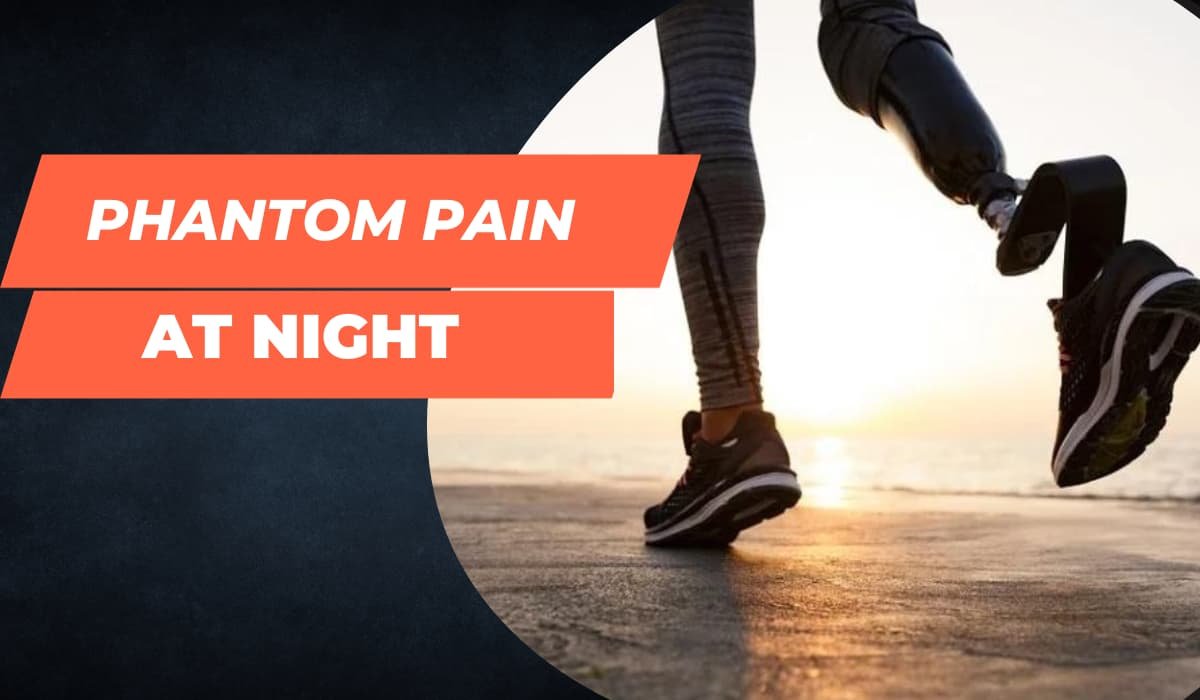Why Is Phantom Pain Worse At Night? – Causes And Remedies!

Phantom limb pain, or PLP, refers to the painful sensations or discomfort that come from a limb that has been amputated or is no longer there. The onset of pain often starts soon after the surgery or in the weeks or months afterward. It can make you feel burning, twisting, and cramping sensations in the amputated region. Nearly 80 percent of the amputee population in the world has experienced PLP at least once.
Understanding Phantom Pain: Why Does It Haunt You More?
The pain may be ongoing or unpredictable. The reason behind the incidence of PLP is that the brain attempts to move the limb that is no longer there. As it is not possible to move, faulty pain signals are being sent to the brain. It is observed that people who have undergone amputation often experience PLP worsening at night, keeping them up at night. This article will explore why phantom pain flares up at night and offer a few steps to lessen it.

What Makes Phantom Pain Worse At Night?
Even when there is no pressure from weight bearing, many amputees experience an increase in phantom pain at night. More than half of those individuals have reported having disturbed sleep due to PLP. In fact, one of the main complications of phantom limb pain is difficulty sleeping. Moreover, lack of sleep can worsen the pain. Here are the other factors that trigger the nighttime phantom pain:
- Fewer distractions: At bedtime, there is no pressure from daytime activities, which means there are no meetings, phone calls, errands, or school events to attend to. Rather, it is just you and your thoughts. Under these circumstances, we become super conscious of our surroundings, which forces us to notice and concentrate on the pain. Rather than helping us fall asleep, the brain becomes concerned with the nerve pain. This can lead to increased irritability with everything that surrounds you.
- Changes in weather: Changes in temperature and barometric pressure have a great impact on neuropathic pain. When the temperature drops, our perception of pain shifts, causing pain. This is because the peripheral nerves that are responsible for sending signals to the brain about the temperature can also pass pain signals. So, when our nerves are damaged, the brain may translate changes in temperature into feelings of tingling or pain. Also, cold temperatures slow the heartbeat, thus leading to slower blood flow. Adding additional blankets will help keep the body warm. Changes in atmospheric temperature can cause changes in the barometric pressure of a region. These changes can intensify the pressure on the nerves, which send pain signals to the brain.
- Stress: Any emotional or physical stress can also cause PLP. Rigorous exercise or stress from a long day at work can have an impact on our well-being. You might feel that your body is still recovering from the stress of the day even when you are going to bed. This is how stress induces PLP at night. Hence, find ways to reduce stress.
Tips To Get Relief From Phantom Pain
PLP treatments involve medication, non-medication, or a combination of both to relieve the nighttime PLP. Apart from the medications, we could also follow certain non-medical approaches to get relief from PLP. They include:
- Psychological distractions: If you face difficulties falling asleep due to increased consciousness, doctors often recommend visualizing something you adore. This allows you to stay distracted from the pain and helps you fall asleep.
- Hot or cold therapy: One of the major reasons behind phantom pain is the residual limb being cold or hot. Therefore, options such as cold or warm baths and ice or heat pads can keep the limbs warm or cold and reduce the pain caused by changes in temperature.
- Massage: The cutting of nerves during amputation is one of the reasons for the occurrence of pain post-surgery. Massaging, slightly rubbing, or stimulating the stump can not only help de-stimulate the nerve endings but also help you relax.
- Breathing exercises: Breathing exercises are proven to slow the mind and relax the body.
- Stretching: Stretching before going to bed for a few minutes can dissipate the tension that has piled up in the body and loosen the joints and tissues in the body. Combined with slow breathing, it helps you relax your mind.
- Acupuncture: Acupuncture is effective for phantom pain and is even recommended by the NHS as a treatment. Acupuncture may help you regulate the central nervous system and reduce nerve signals that cause PLP.
- Weighted blankets: Pressure from weighted blankets increases the production of serotonin and promotes a peaceful mind that aids you in falling asleep. Additionally, it has also been proven to be effective in pain mitigation.
End Note
Phantom limb pain is a common occurrence after amputation, and it often improves with time. Changes in weather, fewer distractions, and stress are the major reasons that make phantom pain worse at night. Doctors utilize both medication and non-medication therapies to alleviate the phantom pain. The above-mentioned are some of the non-medical approaches to phantom pain.
Dr. Edward Zelman
Dr. Edward Zelman is a distinguished and highly respected medical professional who has dedicated his career to the field of general medicine. With a profound commitment to patient care and a wealth of knowledge acquired over decades of practice, Dr. Zelman has earned a reputation as a trusted healthcare provider in his community. With a career defined by excellence and an unwavering commitment to the betterment of his patients and the broader community, Dr. Edward Zelman stands as a pillar of the medical field, dedicated to the principles of healing and compassionate care. At present, Dr. Edward Zelman is researching safe and effective natural remedies that can restore as well as maintain the youthful functioning of the body.
View All By Dr. Edward






